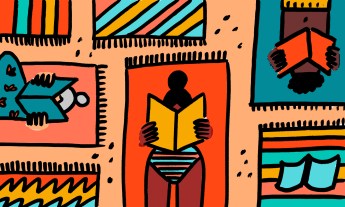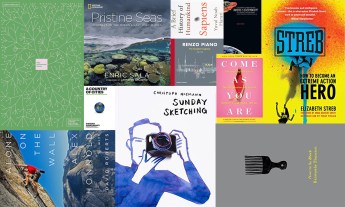
As a psychotherapist and writer, I see firsthand the power of stories — not only how faulty narratives can hold us back but also how simple edits can transform our lives.
In my book Maybe You Should Talk To Someone, I bring people into the therapy room (two of them, actually: mine, where I’m the clinician; and my therapist’s, where I’m the patient) to show how the process of revising our stories works and how readers can apply it themselves. The thing about stories is that no matter how meticulously we plan our lives, there are always plot twists and it’s often in uncertainty where the seeds of growth are planted.
We are living in especially uncertain times now, so I’ve compiled this reading list. Read one book or read them all, in any order you’d like. Use them as a guide to examining your own story — looking at what’s no longer (or was never) true, what’s holding you back, and what the protagonist will do in the next chapter. Then, start rewriting the story of your life. Happy editing!
Love’s Executioner: And Other Tales of Psychotherapy by Irvin Yalom
Often considered to be “the Oliver Sacks of psychiatry,” Yalom, a professor emeritus of psychiatry at Stanford, has been revolutionary in bringing his patients’ stories to life in the pages of his books. Love’s Executioner is a moving, incisive and unforgettable portrait of our shared humanity that helps us re-examine our own stories and our capacity for growth and change.
The Tennis Partner by Abraham Verghese
In this gorgeous memoir about the friendship between a promising medical resident struggling with a drug addiction and his mentor who’s going through a divorce lies a larger story about what we do with those big inflection points — those chapter endings and possible beginnings when we can choose a different path — and how those choices shape the course of our lives. This is a book that asks the reader to consider: What is my responsibility as the author of my own story?
The Unwinding of the Miracle: A Memoir of Life, Death and Everything That Comes After by Julie Yip-Williams
What happens when we’re faced with the biggest plot twist imaginable — a terminal diagnosis in the prime of life? Yip-Williams decides to write her raw, riveting and often wry story as “an exhortation to the living” to “live while you’re living.” In other words, she’s asking us to pay attention every day to the stories of our lives, big and small.
Thanks for the Feedback: The Science and Art of Receiving Feedback Well by Douglas Stone and Sheila Heen
Sometimes we’re so stuck in our version of events that we can’t imagine another perspective. Here, Stone and Heen, lecturers at Harvard Law School and corporate consultants, show us the power of giving and accepting good feedback in order to fill in the crucial parts of our stories that we’d been missing.
Broken Open: How Difficult Times Can Help Us Grow by Elizabeth Lesser
Combining her own and other people’s stories with research from psychology and philosophy, Lesser offers practical wisdom on how to turn life’s hardest challenges into our most meaningful transformations. It’s a master class in how to turn your story around.
We Learn Nothing by Tim Kreider
Despite the title, Kreider’s hilarious, candid and wholly original essays on everything from what makes a family to why we fall in love with people we don’t even like teaches us a great deal about the big questions we all ask ourselves and offers a new way to think about them. A great first step in becoming more flexible with your story.
Self-Compassion: The Proven Power of Being Kind to Yourself by Kristen Neff
Many of us have a self-critical voice in our heads that distorts our belief in who we are and what we can achieve. In Self-Compassion, Neff shows us how to free ourselves from the stories that hold us back in all areas of our lives.
Mindshift: Break Through Obstacles to Learning and Discover Your Hidden Potential by Barbara Oakley
Our culture often classifies traits as positive or negative, and when we internalize these arbitrary labels, we’re stuck with a faulty inner narrative. Dr. Oakley challenges these stories and shows instead how we can turn our perceived weaknesses into our greatest strengths.
Olive, Again by Elizabeth Strout
Olive, the main character in this novel, returns in a wholly surprising way. At the end of the previous book featuring Olive (Olive Kitteridge), it seems clear to the reader who the curmudgeonly Olive is. But now, as a grandmother and soon-to-be widow, Olive reveals another side of her story and serves as a model for how the story people tell about us — and the story we tell ourselves about who we are — has ample room for revision, even at the end of our lives.
Watch her TED Talk now:











